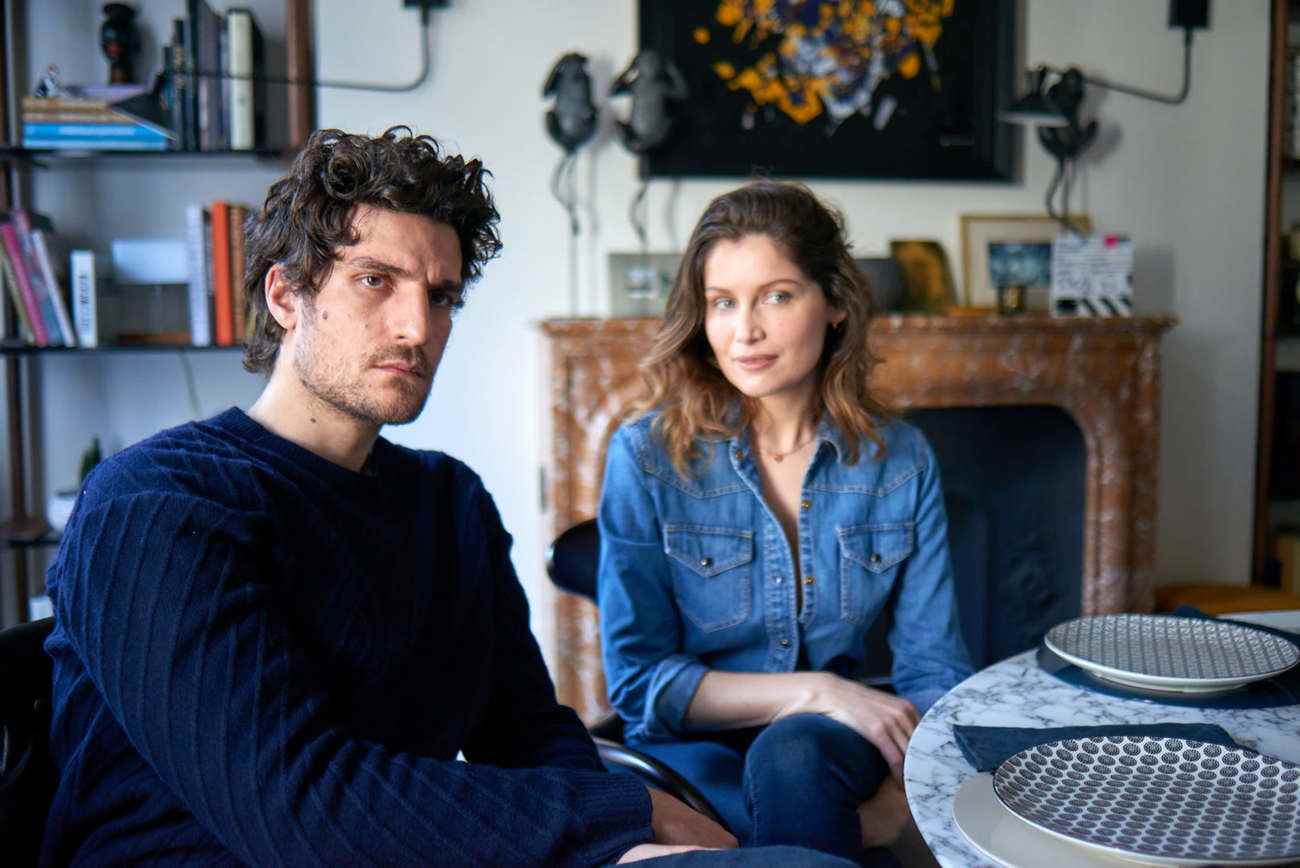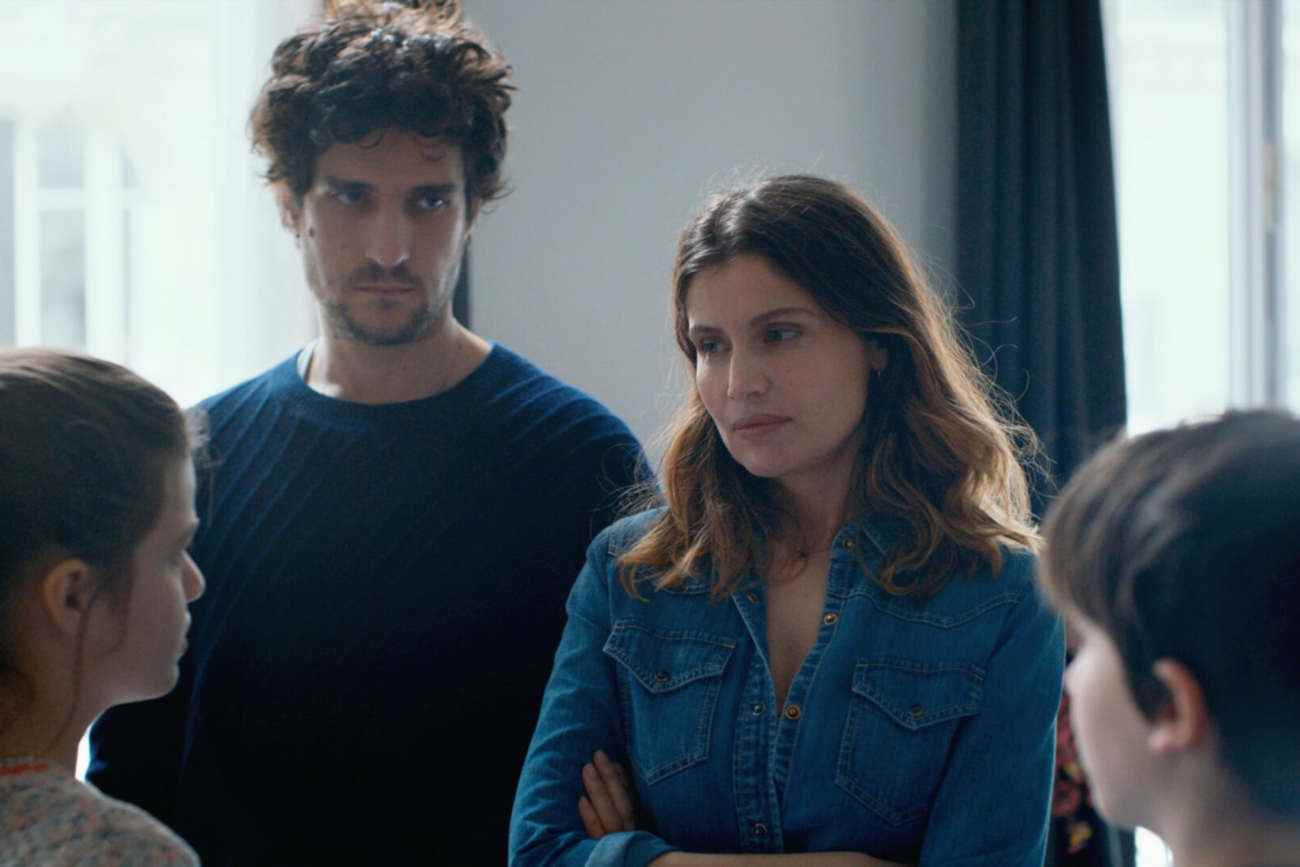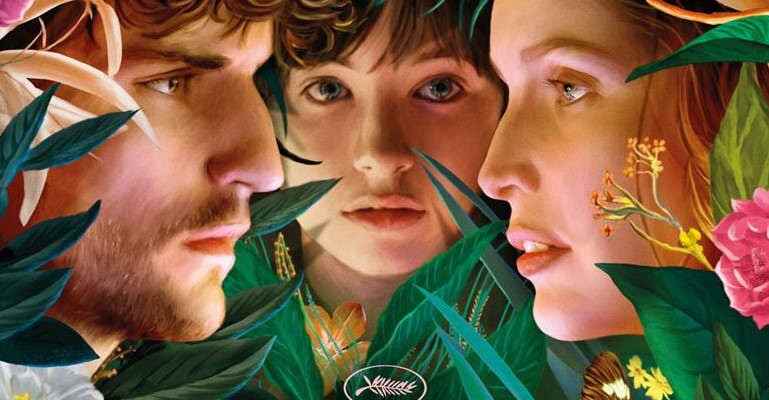The actor-director has shot a whimsical, eco-friendly fable, “The Crusade,” where he and his wife Laetitia Casta play a couple. “A comic film because it is optimistic,” he says.
Where is your scooter, worries the father? “I sold it”, answers the son, who also sold other unused objects in the house, things that were useless, mom’s Dior dress, dad’s watches, jewelry, books, bottles of wine, shoes … Desperate face of the parents! It is with this delightful first scene that begins “The Crusade” (released on December 22), a film by Louis Garrel, in which he plays the father, Abel, and his wife Laetitia Casta, the mother, Marianne.
As in their previous film, “L’homme fidèle”, the young Joseph Engel plays their son, the one who “sells things” for a good cause: “saving the planet”. The kid is part of a network of mini Greta Thunbergs, in fact a real international organization, children who have chosen not to remain idle in these bad times of climate crisis. If they sell things, it is to finance a secret project, an ecological mission: to replace the desert with water and create a sea in the Sahara. If the father is a little circumspect, the mother is rather sensitive to the utopian project of this determined youth, who teaches their parents a lesson.
The only fiction among a series of documentaries selected by the Cannes Film Festival, in the ephemeral section “Cinema for the Climate”, “The Crusade” is originally an idea of Jean-Claude Carrière, co-author of the script. Also presented at the closing of the Festival Cinémaplanète in Metz, organized by the European Institute of Ecology, this film is an ecological fable, sympathetic, fanciful, hardly anticipation in this world where the gentrified and rather passive adults are overtaken by their active offspring. “I think the film is a bit of a juggernaut, there is a comedy, a mini adventure film, a small marital crisis, the idea that a woman begins to admire her child more than the father of her child, there is a moral tale, an ecological fable, and a background of optimism,” says Louis Garrel.
Interviews at Rosa Bonheur, a bar-peniche on the Seine, docked near the Invalides in Paris.
Louis Garrel : “I don’t have any lessons to teach people
Was it Jean-Claude Carrière’s ecological influence that got you involved in this film ?
Louis Garrel : Yes, we were on tour for “L’homme fidèle”, the previous film we had made together, and he told me that he had a good idea while traveling and sent me the first scene of the film. I read it, I find it very well written, very funny, but when I see children who are passionate about climate change, I say to myself that it doesn’t work, I don’t believe in it, I don’t think it’s right. He continued to write in his corner, it was the only thing that interested him before he died, and a few months later came the story of the young Swedish woman Greta Thunberg who was on hunger strike. I call Jean-Claude a bit in flip, and after Greta it goes very quickly full of kids in the world are on strike, so we developed the subject. I didn’t want to do something militant, I didn’t know how to approach it. In fact, the writing of the character I had to play is really at the height of my stupidity on the ecological subject, he is like everyone else, he is at the west.
How stupid are you on the subject ?
Just like everyone else. Intelligent when you listen to scientists talking, you are more informed about this climate change thing, but I don’t have any lessons to give to people, I’m not here to say what’s good, what’s bad, I don’t know anything about it, I’m stupid. I’m like everyone else facing a sea of helplessness in which we find ourselves when the news tells us that it’s black shit, that there are mega-fires, that the snow is melting, that the ecosystem is out of whack… Either we don’t think about it because it’s too violent, or when we do think about it, we want to act but we don’t know what to do. But what the film tells us is that a part of the fourteen year olds, who are free of the material contingencies in which we find ourselves, who have a sense of community and still a deep desire to change, and because they are physically threatened, the resources are developed, the imagination is developed, the will is increased tenfold to get out of it.

Do you feel that this young generation is more concerned than previous generations, including your own ?
Yes, the scientific discoveries, the scientific analyses, the curves, are beginning to be seen all over the world. The world is populated by logical, intelligent people. There was the President of the United States who was a climate denier, there are still people who say that it is false, but awareness has become collective. Now we are in a situation that was the subject of a book by Jean-Claude Carrière, which should have been called “Crisis versus crisis”, economic crisis versus climate crisis. The film is optimistic, comical, comical because optimistic, the human species has a very strong life drive. But faced with this ecological problem, we cannot develop as much imagination as the people concerned, who are children for the moment, and we will have to delegate power to people who will no longer be children in six years. Greta Thunberg’s happening was so strong, so spectacular, that people thought she was manipulated, that she was a puppet; but no, it is both her, her talent, her malice, and also a biological surge that makes a spontaneous generation that opens our eyes.
Is the solution proposed by the young people in the film, a sea on African soil, imaginary ?
They are no longer children who demonstrate, they are children who act, not in destruction, they have a pharaonic project. This one is viable, I went to see geographers, and this project of an inland sea has already existed, notably in Algeria, to cool the climate and to favour cultures, it was not for climatic stakes but for commercial stakes. Jean-Claude was sure that this solution would be used, we will have to store this water which is covering continents.
This sequence on the particle alert in Paris refers to what we have been experiencing for the last two years with covid …
What is crazy is that the film which, three years ago, was a science fiction film, very quickly became almost a period film. We had to interrupt the shooting during the confinement, but I filmed myself alone in the streets, to stick these images to the scene of the particle alert, it gave a kind of strange objective synchronicity.
Did the making of this film make you change your behavior ?
It would be wrong to say yes. Even sorting out is sometimes complicated, as a citizen it seems to me that it should be drastic, that I don’t have the choice anymore. All these small changes seem tiny compared to the challenge that scientists announce, it must be done in a much more massive way. The film likes to dream, the children’s project is pharaonic, it seems to be equal to the climate peril. The small drops of water are not enough, it should be accompanied by a much stronger impulse, but I tell myself that we should not despair.
Do you think that with the light tone of the comedy, it is finally more effective than the militant documentaries with a tone sometimes a little leaden ?
I think it’s a more pleasant cinematographic form, more enjoyable to watch, than the designated good from the beginning, where you are a bit cornered. It seems to me that in this film there is a greater freedom in the identification. The film also tells of that childhood moment that we all had, the conviction that the world was bad, and that we were going to do something together to change it, and it is this idea that persists in the film.
Is ecology the new crusade of modern times ?
Yes. The first crusade was religious, this is a crusade of survival, that’s why I borrowed the title.

You play a more receptive mother, more understanding with the children, is it a maternal reflex ?
Laetitia Casta : No, I’ve encountered this with men who have found themselves in the situation of having to raise their children alone, it’s not at all more proper to a woman. But I want to tell you that this sensitivity is feminine, whether it is for a man or a woman, that is to say the instinct of survival, listening, sensitivity, respect for the other, empathy…
Before this film, did you already have a sensitivity to ecology ?
I am not an activist, but my grandfather was a forest ranger and I saw him cry when the forests were devastated by fire in Corsica, and it was he who replanted entire forests. I was lucky enough to live in Normandy, in the middle of the forest, to see the seasons go by, the animals, to know the names of the plants, it’s something that is part of my childhood, it’s the place where I recharge my batteries. When I am in contact with nature, I feel good, I have this notion in me, it is something natural, it is not something that I built, it is part of me.
Do you think that the film can help to change behavior ?
It takes away the guilt already, and allows us to pass on a deep subject with a bit of self-deprecation, we can all recognize ourselves in Abel, in Marianne, in the children. Even if it is a small drop in the sea, to pass this message joyfully is always interesting. In gestures, we do what we can, but children are raised today with this awareness, it is part of their daily life, the children tell me about it, we can not pretend.
What do you think of the fashion houses that have decided to stop selling animal fur ?
I think it’s good, for me fashion has to be intelligent too, that it’s not just a superficial thing, that we manage to do both at the same time is not bad, it’s sensitivity and creation at the same time. For example, now if a brand does not do ecology, it is not seen well, it is a bit old-fashioned; I am currently working with a brand that collects waste in the sea to make clothes, it moves.
But it is often the economy that decides…
Unfortunately, it is capitalism that kills the youth, that sends them a lot of anxiety about their future, whereas we should be telling them something else, that of finding themselves, of going after their desires, the joy. Unfortunately, it’s all about making money, money, money, everything is governed by that. Moreover it is the speech of Greta Thunberg, it is a little sad because it is very frightening, it is as if one mutated them to become a kind of machine to succeed absolutely, it is the success which counts and more the individual.
You already played a couple with your husband Louis in his previous film, “L’homme fidèle”, what is it like to shoot as a family ?
I didn’t think I would be making a film with Louis, it wasn’t in my karma. I did a lot of things on my own, I came into the film world but my family had nothing to do with it, and I learned a little bit on the job. All of a sudden, having someone from my intimacy propose a film to me, I was very afraid, it was strange this mixture of reality and cinema, wasn’t it going to damage something. Imagine that the film doesn’t work, that it doesn’t go well, it can be very violent; and in fact, I realized that sharing that too, the creative side, not separating the worlds, is a way of discovering ourselves in a different way and that an object created together is very strong. The pleasure of being together, of enjoying being together, of making together, is rare in cinema. Louis is used to it, I wasn’t, he taught me something, and this second film was even more joyful, even more relaxed, confident, it reminds me of the films of John Cassavetes and Gena Rowlands, made at home. And I didn’t find that on the other shoots after.
At the beginning of the film, the children sell things belonging to their parents, do you have an attachment to objects?
No, I am not so attached to material things, I am perhaps more attached to the story of an object, what it tells me personally, I do not need to possess absolutely.
Interview by Patrick TARDIT
“La Croisade”, a film by Louis Garrel, with Laetitia Casta (released on December 22).
